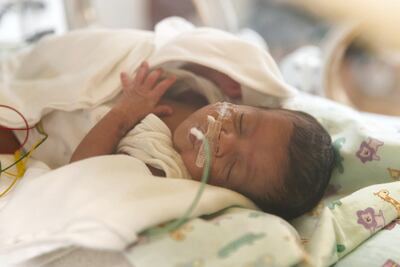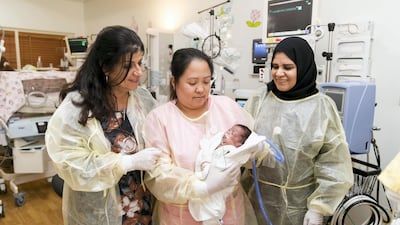Kuwaiti Abdalziz Al Rashdi’s wife was pregnant with twin boys and this week he is going back to his homeland with only one of them but, rather being sad, he is grateful.
When doctors said there was a 95 per cent chance that both his boys would die without treatment, he found that he couldn’t help but be pleased that one of them, Dahm, managed to survive.
The twins had twin-to-twin transfusion syndrome, which is a condition where one of the two gets the majority of the blood supply and the other is starved and dehydrated. Both would have almost definitely died without a medical procedure that was not available in Kuwait or anywhere in the region.
“We found out very late that the twins had this condition and there was no treatment in Kuwait,” Mr Al Rashdi said.
The government of Kuwait sent them to the only place in the region that could do a procedure in the womb where the blood vessels are severed by a laser so that each baby gets their own blood supply – Corniche Hospital in Abu Dhabi.
Mr Al Rashdi’s wife, Maha Abdel Mohsen, was 25 weeks pregnant when they arrived in the capital at the end of July.
“We came late because she was misdiagnosed in Kuwait and her doctor told us that the only problem she had was that there was too much water. We were in shock when we found out,” he said.
Dr Leanne Bricker, consultant and chair of foetal medicine at Corniche, said they needed to take immediate action.
“The family from Kuwait came late. We were very worried and, if we hadn’t done the surgery, they both would have died, so the fact we saved one baby, we consider a success,” she said.
Dr Bricker arrived in 2014 to develop foetal medicine at the hospital. Today it is the only centre of excellence where women with difficult pregnancies are referred to and they see up to 400 cases per month.
“People think that foetal medicine is about having a scan - imaging department do scans - foetal medicine is about scanning when there is a problem or there has been a previous problem and managing it,” she said.
“We use scans as a fall-back but it is much more than that. We interpret the scan and talk to patients about what the scans mean. The next level of foetal medicine - therapeutic foetal medicine, which is not available anywhere in the UAE – is where we treat the baby in the womb.”
The two main procedures are foetal transfusion and fetoscopic laser.
“About 30 to 40 per cent of twins share a placenta and, of those, they share blood vessels in the placenta and in about 15 to 20 per cent of the cases, one baby will get too much supply and the other will get too little blood supply,” Dr Bricker said.
“Left untreated, over 95 per cent of the babies will die in the womb or will be born early and likely die. Both babies are sick; the bigger one is sick because it’s getting too much blood and will get heart failure and the little one is effectively starved and dehydrated. A lot of people think that only the little one is sick but both are sick and, without treatment, they will both die.”

With treatment, there is a 90 per cent chance that at least one baby will survive. In the past two years, the hospital has done this surgery 33 times.
The foetal medicine clinic was specifically set up so that women did not have to travel abroad for such treatment, which would put lives at risk due to the delays involved.
Immediately after their arrival in the UAE, Mr Al Rashdi’s wife had the surgery and she delivered the boys two weeks later, one weighing just 600 grams and the other weighed 1kg.
“We expected that he wouldn’t make it,” said the father, talking about the smaller of the two boys.
“In Kuwait he weighed only 280 grams. We named him Dahoon and we have accepted his death but we are so grateful that we get to go back home with his brother.”
Read more: Abu Dhabi hospital staff who delivered 400g baby overjoyed
Mr Al Rashdi’s wife has since gone home to be with her family in Kuwait after being in Abu Dhabi for three months. Her husband will join her with their baby this week.
“If it were up to me, I would never leave. We could have done the surgery and gone back to Kuwait for my wife to deliver there but the care and medical services I saw here are like nowhere I’ve seen in the world,” he said.
“I insisted that she deliver that boys here and to remain until they are well enough.” The family already have twin girls aged 3 and another girl aged 1.
“Dahm is my first boy. The entire family is excited to see my son who almost didn’t make it,” he said.

